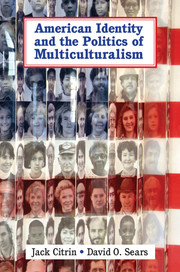Crossref Citations
This Book has been
cited by the following publications. This list is generated based on data provided by Crossref.
2015.
Publications Received.
Contemporary Sociology: A Journal of Reviews,
Vol. 44,
Issue. 2,
p.
296.
Kivisto, Peter
2015.
Introduction: The Puzzle of Incorporation and Solidarity.
The Sociological Quarterly,
Vol. 56,
Issue. 4,
p.
581.
Wright, Matthew
and
Reeskens, Tim
2015.
The Politics of Patriotism: The Unexplored Link between Policy, Patriotism, and Public Opinion.
SSRN Electronic Journal,
Schildkraut, Deborah J.
2016.
Latino Attitudes About Surrogate Representation in the United States*.
Social Science Quarterly,
Vol. 97,
Issue. 3,
p.
714.
2016.
Books received.
Ethnicities,
Vol. 16,
Issue. 2,
p.
345.
Levy, Morris E.
and
Wright, Matthew
2016.
Re-Examining Group-Centrism in American Public Opinion: The Case of Anti-Latino Sentiment and Immigration Policy Attitudes.
SSRN Electronic Journal,
Suhay, Elizabeth
Calfano, Brian
and
Dawe, Ryan
2016.
Social norms, dual identities, and national attachment: how the perceived patriotism of group members influences Muslim Americans.
Politics, Groups, and Identities,
Vol. 4,
Issue. 1,
p.
63.
Schildkraut, Deborah J.
2017.
White attitudes about descriptive representation in the US: the roles of identity, discrimination, and linked fate.
Politics, Groups, and Identities,
Vol. 5,
Issue. 1,
p.
84.
Wright, Matthew
Johnston, Richard
Citrin, Jack
and
Soroka, Stuart
2017.
Multiculturalism and Muslim Accommodation.
Comparative Political Studies,
Vol. 50,
Issue. 1,
p.
102.
Wolak, Jennifer
and
Dawkins, Ryan
2017.
The Roots of Patriotism Across Political Contexts.
Political Psychology,
Vol. 38,
Issue. 3,
p.
391.
Kębłowska-Ławniczak, Ewa
2017.
Multiculturalism, Multilingualism and the Self: Literature and Culture Studies.
p.
3.
Wilson, David C
and
Davis, Darren W
2018.
The Racial Double Standard.
Public Opinion Quarterly,
Vol. 82,
Issue. 1,
p.
63.
Lee, Taeku
and
Kim, Sunmin
2018.
The Mechanics of Immigration Polls.
Public Opinion Quarterly,
Vol. 82,
Issue. 1,
p.
148.
Kwon, Ronald
Flores, Brigitte
and
Yonamine, Haydee
2018.
Spatial Segregation and the Impact of Linguistic Multicultural Policies Within the USA.
Journal of International Migration and Integration,
Vol. 19,
Issue. 2,
p.
213.
Fitzgerald, Jennifer
2018.
Close to Home.
Myers, Dowell
and
Levy, Morris
2018.
Racial Population Projections and Reactions to Alternative News Accounts of Growing Diversity.
The ANNALS of the American Academy of Political and Social Science,
Vol. 677,
Issue. 1,
p.
215.
Huo, Yuen J.
Dovidio, John F.
Jiménez, Tomás R.
and
Schildkraut, Deborah J.
2018.
Local policy proposals can bridge Latino and (most) white Americans’ response to immigration.
Proceedings of the National Academy of Sciences,
Vol. 115,
Issue. 5,
p.
945.
Petrow, Gregory A.
Transue, John E.
and
Vercellotti, Timothy
2018.
Do White In-group Processes Matter, Too? White Racial Identity and Support for Black Political Candidates.
Political Behavior,
Vol. 40,
Issue. 1,
p.
197.
Kim, Sun
and
Jung, Dong-Joon
2019.
Ideology, nationalism, and education: the case of education reforms in the two Koreas.
Asia Pacific Education Review,
Vol. 20,
Issue. 2,
p.
295.
Lluch, Jaime Gerardo
2019.
Unpacking Political Identity: Race, Ethnicity, and Nationhood in a Federal Political System.
Ethnopolitics,
Vol. 18,
Issue. 2,
p.
178.



